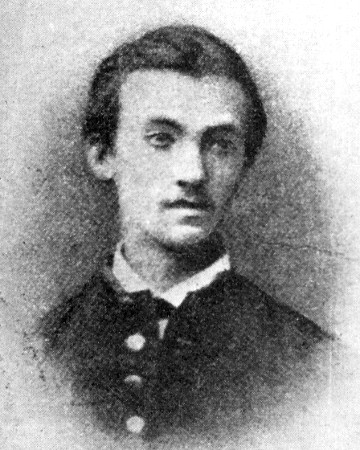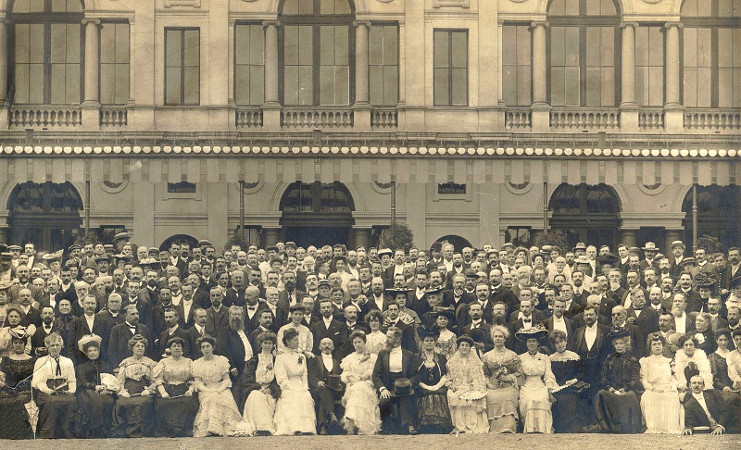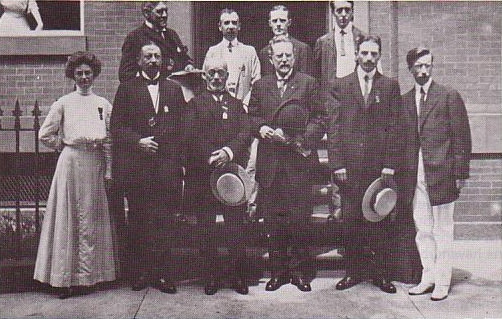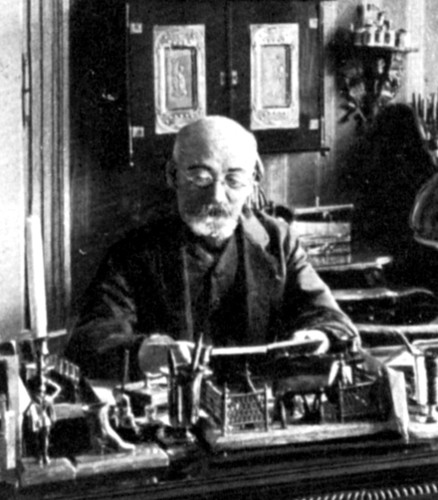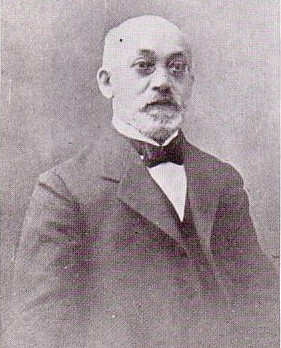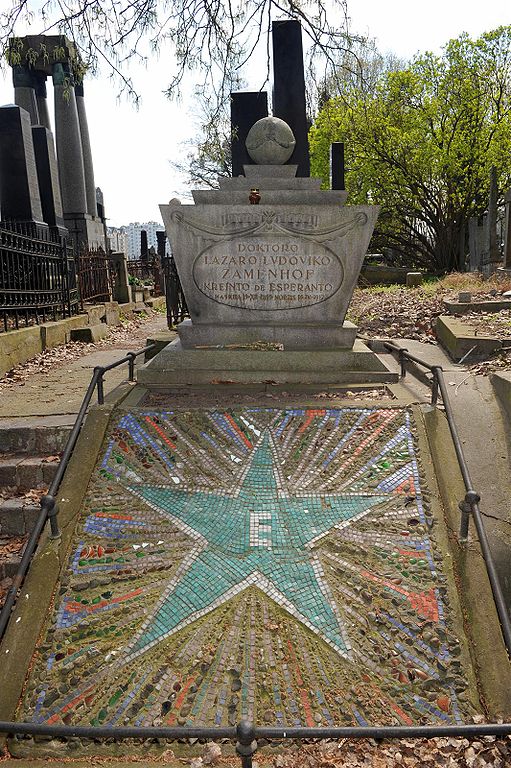Chronological biography
-
1859
December 15th: Lejzer (Lazar) Markovicz Zamenhof is born in the family home (6 Green Street, Białystok) to parents Mordka (Mark Fabianovicz) and Libia Rochla (Rozalia) Zamenhof.
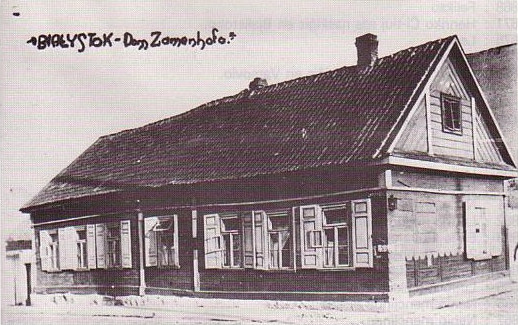
-
1869
August: He starts first year of college in Białystok, but has to halt his studies after two months due to health issues.
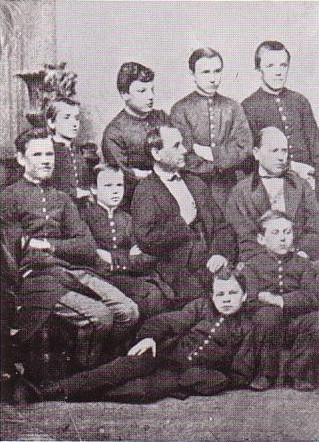
-
1870
August: He starts the first year again.
-
1873
August: He starts the fourth year, but his studies last only four months.
December: Zamenhof's family moves to Warsaw (28 Nowolipie Street).
-
1874
August: Starts attending the second year of the second male grammar school of Warsaw.
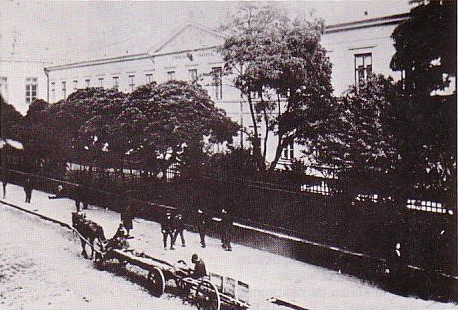
-
1878
December 17th: Celebrations of the completion of Lingwe Uniwersala.
-
1880
Finalises the grammar of his modernisation project of the Yiddish language - a Germanic language which evolved among Jewish people in Europe.
-
1881
March 13th: Tsar Alexanders II is assassinated and the situation in Russia becomes destablised.
May: Passes his exams in the Moscow University and decides to pursue further studies in Warsaw.
Summer: Finalizes two notebook on the 'Lingvo Universala'.
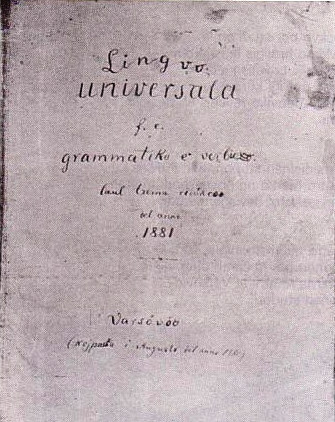
September: Starts studies in the medical faculty of the Warsaw University.
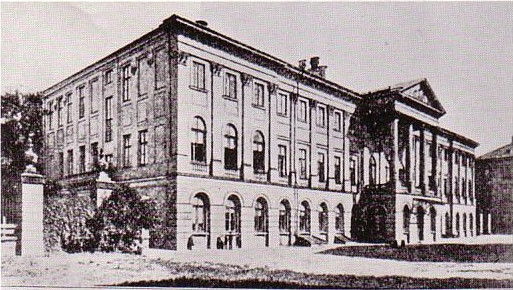
-
1882
January-February: Releases article What to finally do? in the Russian language weekly Jewish magazine Razsvet.
February: Founds the Zionist society Sheerit-Israel.
April 7th: Releases the article All under one banner! in Razsvet.
August: The third notebook of 'Lingvo Universala'.
-
1883
August 18th: Co-founds the Warsaw chapter of Hibbat Zion (a forerunner of modern Zionism) and is elected as the president of the Hibbat Zion national committee.
November 18th: Sent a letter to the youth Jewish socialists of the 'Bilu' group.
-
1884
December: Completes university studies.
-
1885
February-May: Worked as a doctor in Viesiejai, Lithuania.
May-November: Traineeship in the ophthalmology faculty of the Warsaw Jewish hospital.
December 1885 - May 1886: Eye doctor in Płock.
-
1886
May-June: Studies and traineeship in Vienna.
Autumn: Met Kejla (Klara) Zilbernik.
-
1887
March 30th: Lazar Zamenhof and Klara Zilbernik get engaged.
June 2nd: The Russian edition of "Unua Libro" (The First Book) sucessfully passes the censorship board for publication.
July 26th: Permission is granted for the release the book in other languages, and outside of Russia. This is considered to be the date of birth of the language.
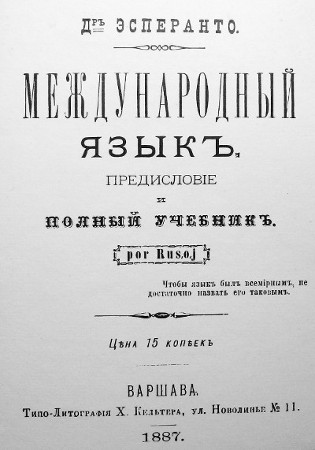
August 9th: Marriage. The newly-weds moved to 9 Przejazd Street.
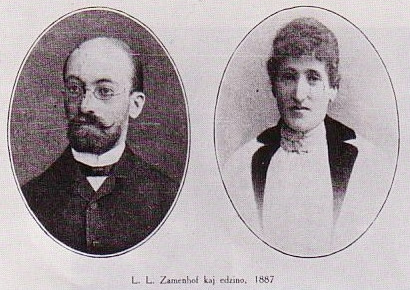
Autumn: The French, German and Polish editions of the "Unua Libro" are released.
-
1888
January: "Dua Libro de l’ lingvo internacia".
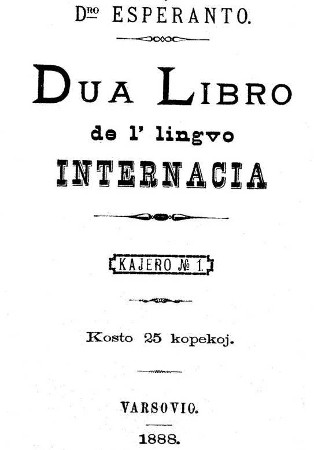
June 11th: Adam Zamenhof is born.
September 24th: He makes a formal request for the permission of the Russian authorities to publish a weekly magazine "La internaciulo".
October 15th: The request for the state's permission to publish La internaciulo was rejected.
-
1889
January-February: Publication of Russian-Esperanto and Esperanto-German dictionaries.
September 1st: The first issue of "La Esperantisto" is released.
November: Establishes himself as the eye-doctor in Herson.
December 13th: Zofia Zamenhof is born.
-
1890
March 25th: The International League of Esperantists is established.
May: Return to Warsaw (specifically to 21 Nowolipki).
Autumn: "La Espero" is first published. It would go onto become the Esperanto anthem. It first featured in the book Vsemirnyj jazyk Esperanto ("The International language Esperanto").
December: The International League of Esperantists, established just 9 months earlier, already disbands, having failed to ever get off the ground.
-
1891
December: Zamenhof decided to pause the regular La Esperantisto publication, but thanks to Wilhelm Heinrich Trompeter it continued. He took over the publishing costs and started to pay Zamenhof an editor's salary.
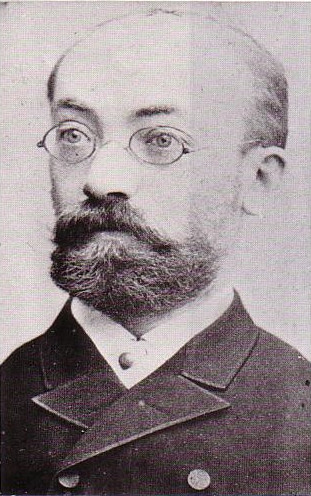
-
1892
August 31st: Death of Liba Rohla Zamenhof
-
1893
January: The International Esperanto League is established with Zamenhof as a secretary. Its aim is to be a uniting voice of the Esperanto movement.
August: The "Universal Dictionary" is released.
October: Relocated to Grodno.
-
1894
January: The earliest proposals to reform Esperanto are made in "La Esperantisto".
Novermber 15th: Zamenhof voted to reject the proposed reforms. "Ekzercaro" and "Hamlet" are published.
-
1895
August 15th: The final edition of "La Esperantisto" is released (1895, no. 5-6). Zamenhof halts almost all Esperanto related activities for several years.
-
1896
Zamenhof and his colleague Vilhelm Ŝenberg jointly undertake a research project which involved testing the eye sight of all students in Grodno.
-
1897
October: Return to Warsaw (specifically Dzika 9).
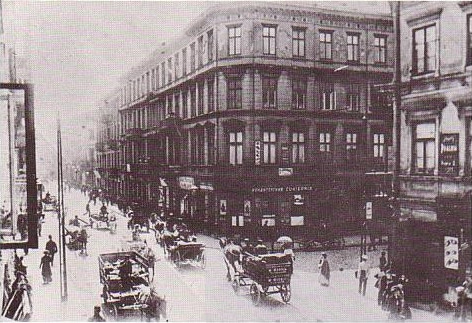
-
1900
August 3rd: Louis de Beaufront, leader of the Ido splinter group, presents "The essence and the future" in Paris.
-
1901
April: "Hilelism, a project to solve the Jewish question" is released.
August 6th: Zamenhof signs a contract with the French publishing house, Hachette.
-
1902
Zamenhof gradually resumes Esperanto-related activities.
-
1903
November: "Fundamenta Krestomatio" is released.
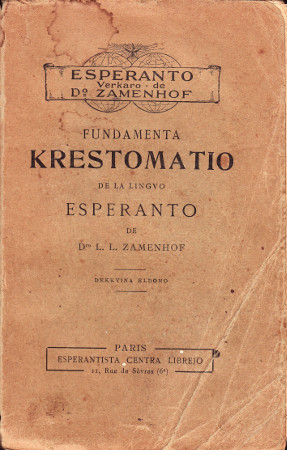
-
1904
January 29th: Birth of Lidia Zamenhof.
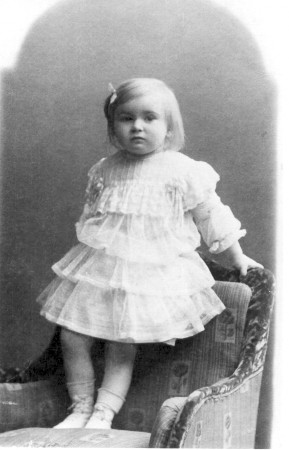
-
1906
January: The "Dogmas of Hilelism" are printed in "Ruslanda Esperantisto".
March: "Homaranismo" is published.
August 27th - September 5th: The second Universal Congress of Esperanto is held in Geneva, Switzerland.
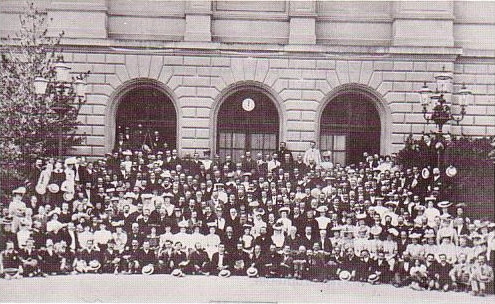
September: The first issue of "La Revuo" is released. It was founded by Carlo Bourlet so that Zamenhof could present his translations.
October 15th-23rd: Zamenhof met with those who sought to reform Esperanto, he tried to negotiate with them.
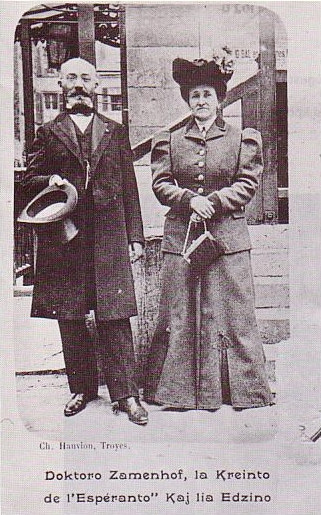
-
1907
August 12th-17th: The 3rd UK, in Cambridge, England.
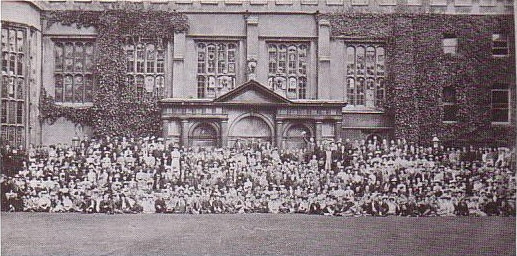
October 15th-24th: The Delegation Committee meets in Paris and accepts Esperanto but with amendments.
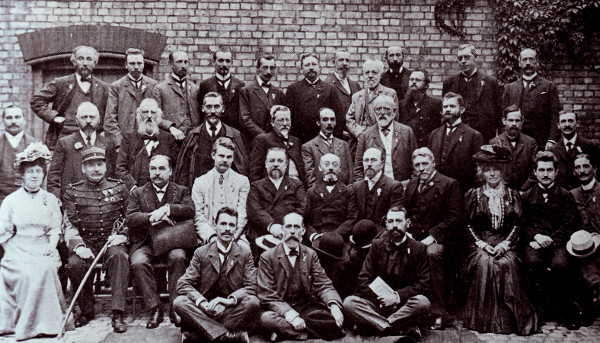
November 30th: Death of Mark Fabianovicz Zamenhof, father of Ludoviko.
The Esperanto transation of Gogol's masterpiece "The Inspector" is released.
-
1908
January 18th: Contacts with the Delegation are broken off.
August 16th-22nd: the 4th UK, in Dresden, Germany.
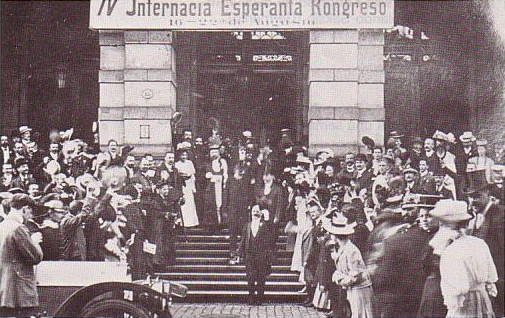
Translations of Ifigenio en Taŭrido (Goethe), La robbers (Schiller), and Georgo Dandin (Molière) were released.
-
1909
September 5th-11th: the fifth UK in Barcelona, Catalonia/Spain.
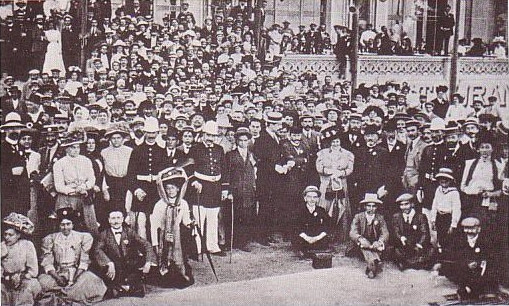
-
1911
July 26th-29th: Takes part in the 'Congress of races' in London.
August 20th-27th: The 7th UK, in Antwerp, Belgium.
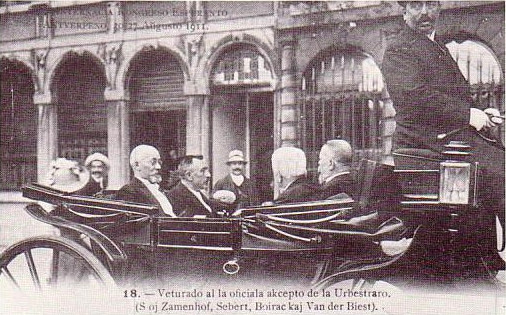
-
1912
August, 11th-18th: The 8th UK, in Krakow, Poland (Tsarist Russian Empire).
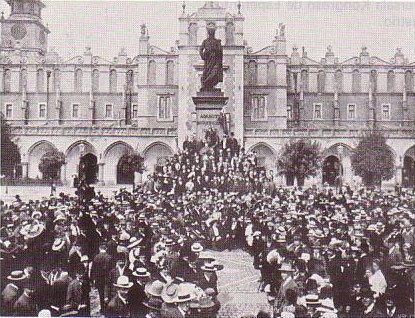
-
1913
May: "Homaranismo" was released (Hilelismo renamed and updated).
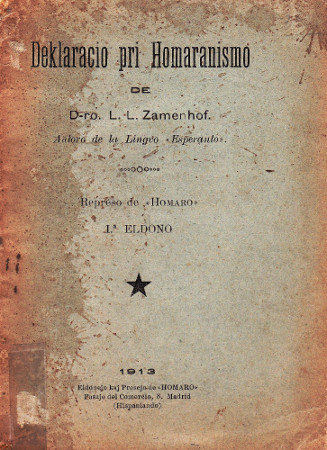
August 24th-31st: The 9th UK, in Bern, Germany.
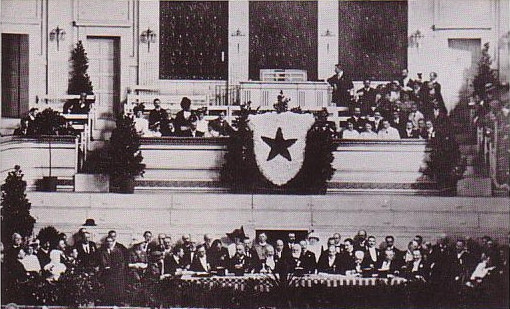
-
1914
September 1st: After attending the UK in Germany, Mr and Mrs Zamenhof become stranded in the city of Cologne due to the beginning of WW1.
September 15th: They eventually managed to get back home to Warsaw after a 2-week detour.
October 18th: The project of a neutral human religion holds its congress.
December: Zamenhof releases his pacifist open letter to political dipomats, "After the Great War".
-
1915
March 3rd: The final translation of the The Old Testament is released.
March: Zamenhof begins to translate the tales of Andersen.
July: Zamenhof moves to Krolewska 41.
The final revision of Esperanto is proposed.
This chronoligcal biography was first published in La Ondo de Esperanto (2009, no. 12).

